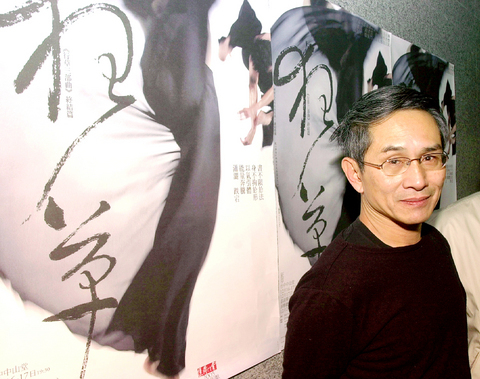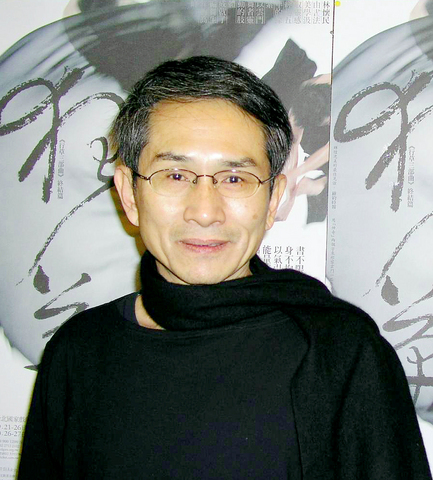The Cloud Gate Dance Theater (雲門舞集) started out in a studio above a Taiwanese noodle shop. Now, 33 years later, it's a world-renowned modern dance company with performances already booked into 2008.
The man who founded the company and still runs it, Lin Hwai-min (林懷民), said he has evolved over the years -- from a topdown choreographer who dictated the dancers' moves to a leader who collaborates with his performers. He said he now tries to draw the material from their movements.
``Everything comes from their bodies. Therefore, very organic,'' he said in an interview.

PHOTO: TAIPEI TIMES FILE
The former dancer and writer also said he became less rigid as he grew older.
``When I was young I thought things were clear-cut. Things had to be straightforward. Now I'm not this way,'' Lin said in a Hong Kong hotel room, where he sat barefoot, cross-legged on a sofa chair while clutching a pillow.
Cloud Gate has graced presti-gious stages like the Kennedy Center in Washington, DC, and Lin was named Choreographer of the 20th Century by Dance Europe magazine. Among his projects this year is a solo for French ballet star Sylvie Guillem, who performed with the Paris Opera Ballet and Royal Ballet of London.

Since founding Cloud Gate in 1973, Lin also set a goal of promoting modern dance in rural Taiwan. Today, he's almost synon-ymous with Chinese modern dance.
Lin, who turns 59 today, said he hasn't done any serious dance workouts since last performing some 23 years ago, but he still looks like a dancer: short, muscular, his robust torso stretching his black shirt.
Lin sprinkled English sentences and phrases into a mostly Chinese exchange, gesturing wildly when demonstrating a dance move.
He said Cloud Gate is in a rarefied state -- focusing on culti-vating the expressiveness of the body instead of telling stories through dance. The company has abandoned pure technical training in favor of encouraging dancers to gain full awareness of their bodies.
``Our teachers tell our students the human body is 90 percent water, so your movement has to resemble water, be as loose as water,'' Lin explained. Cloud Gate's instructors now encompass such varied disciplines as tai chi, martial arts, ballet and calligraphy.
Cloud Gate's latest work reflects its new philosophy. The Cursive trilogy is inspired by Chinese brush calligraphy.
In Cursive I, dancers in simple black costume perform kung fu-like moves on an undecorated stage in a flowing style, taking the ferocious edge off what resemble fighting routines. In one section, a cluster of performers kneel and rise up while raising their arms like hawks.
``It's not just about characters,'' Lin said of Chinese calligraphy. ``It's about the energy ... it has a very good rhythm and it's a sense of musical composition.''
But Lin points out that pure form must be backed up by strong fundamentals.
``If you're not strong in technique, you can be carried by the story, by costumes,'' but not in pure dance, Lin said.
Blending traditional Chinese elements and modern dance is Cloud Gate's trademark, largely the vision of Lin, a writer-turned-dancer educated in Taiwan and at the University of Iowa Writers' Workshop.
Fellow dancer Tom Brown said Lin is a rarity in the modern dance world in that he singularly devoted more than three decades to mold a group of dancers, whereas turnover and mobility is high in companies in the West and few choreographers command the focus of Lin.
The result is a very centered, physical style unique to Cloud Gate.
``European modern dance and even US modern dance quite often is about gesture. It's gesture-driven, if you will, and the thing that I find interesting about his work is that it's driven from something in the core of the body,'' said Brown, associate dean of dance at the Hong Kong Academy for Performing Arts.
Brown attributed Lin's appeal to his liberal arts training method.
``He gives them things to read. They have improvisation sections. They talk about painting,'' he said. ``Whether or not he pays them richly ... the experience itself is completely compelling and completely demanding.''
Despite Cloud Gate's status as a world-class company, Lin said finding funding is still a struggle. While the Taiwanese government chips in, Cloud Gate still needs to tour heavily to galvanize interest among potential donors.
``It's always a battle from New Year's Day to New Year's Eve,'' he said.
``Doing a good job running these three organizations (two dance companies and a dance school) only leaves me with half a life,'' Lin joked.

One of the most important gripes that Taiwanese have about the Democratic Progressive Party (DPP) is that it has failed to deliver concretely on higher wages, housing prices and other bread-and-butter issues. The parallel complaint is that the DPP cares only about glamor issues, such as removing markers of Chinese Nationalist Party (KMT) colonialism by renaming them, or what the KMT codes as “de-Sinification.” Once again, as a critical election looms, the DPP is presenting evidence for that charge. The KMT was quick to jump on the recent proposal of the Ministry of the Interior (MOI) to rename roads that symbolize

On the evening of June 1, Control Yuan Secretary-General Lee Chun-yi (李俊俋) apologized and resigned in disgrace. His crime was instructing his driver to use a Control Yuan vehicle to transport his dog to a pet grooming salon. The Control Yuan is the government branch that investigates, audits and impeaches government officials for, among other things, misuse of government funds, so his misuse of a government vehicle was highly inappropriate. If this story were told to anyone living in the golden era of swaggering gangsters, flashy nouveau riche businessmen, and corrupt “black gold” politics of the 1980s and 1990s, they would have laughed.

It was just before 6am on a sunny November morning and I could hardly contain my excitement as I arrived at the wharf where I would catch the boat to one of Penghu’s most difficult-to-access islands, a trip that had been on my list for nearly a decade. Little did I know, my dream would soon be crushed. Unsure about which boat was heading to Huayu (花嶼), I found someone who appeared to be a local and asked if this was the right place to wait. “Oh, the boat to Huayu’s been canceled today,” she told me. I couldn’t believe my ears. Surely,

Imagine being able to visit a museum and examine up close thousand-year-old pottery, revel alone in jewelry from centuries past, or peer inside a Versace bag. Now London’s V&A has launched a revolutionary new exhibition space, where visitors can choose from some 250,000 objects, order something they want to spend time looking at and have it delivered to a room for a private viewing. Most museums have thousands of precious and historic items hidden away in their stores, which the public never gets to see or enjoy. But the V&A Storehouse, which opened on May 31 in a converted warehouse, has come up